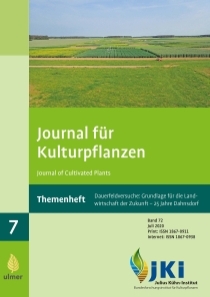Impact of plant protection strategy and soil tillage on the carbon footprint of wheat
DOI:
https://doi.org/10.5073/JfK.2020.07.08Keywords:
climate protection, GHG emissions, LCA, fungicide, integrated pest management, plowAbstract
Climate protection is in the self-interest of agriculture due to the increasing negative effects of climate change on crop production. The effects of different crop protection strategies, the non-usage of fungicides, and reduced tillage were assessed regarding climate impact of wheat production based on a long-term field trial in Dahnsdorf in 2008–2019. The assessment was carried out using a partial life cycle assessment (LCA). On average across all treatments and years, greenhouse gas (GHG) emissions were 3002 kg CO2eq ha-1 and carbon footprint (CFP) was 0.53 kg CO2eq kg-1. Although the treatments with plow caused significantly higher GHG emissions per hectare, their CFPs were not significantly higher than those of the non-plowed treatments. The yield-securing effects of fungicides led to reduced CFPs. Significant differences between years were evident for all three parameters examined. This underlines the need for an evaluation over longer time series and the special value of long-term field trials.
Downloads
Published
Issue
Section
License
The content of the journal is licensed under the Creative Commons Attribution 4.0 License. Any user is free to share and adapt (remix, transform, build upon) the content as long as the original publication is attributed (authors, title, year, journal, issue, pages).
The copyright of the published work remains with the authors. The authors grant the Journal of Cultivated Plants, the Julius Kühn-Institut and the OpenAgrar repository the non-exclusive right to distribute and exploit the work.







